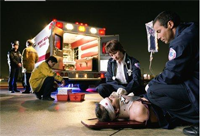
“A volunteer is a person who believes that people
can make a difference – and is willing to prove it.”
-Anonymous
Why volunteer? Because MRC volunteers:
• Can use their knowledge and skills to enhance and preserve public health.
• Will obtain and practice emergency skills through training provided by the MRC unit.
• Learn about disaster medicine and mental health.
• Receive preventive treatment at the onset of an event.
Find the answers to these questions:
Who can volunteer?
What could MRC volunteers do?
How do I become a volunteer?
When do MRC volunteers respond?
What area does the PENINSULA MRC unit cover?
What training is needed?
Is there liability coverage for MRC volunteers?
Does PenMRC keep track of my volunteer hours?
There are two types of MRC volunteers:
Medical and health care professionals from all health occupations to include practicing and non-practicing. These volunteers include: MD, PA, RN, LPN, EMT, Paramedic, Nurses Aide, Pharmacist, Mental Heath Professionals, Respiratory Therapists, Massage Therapists, Physical Therapists, and others.
Support volunteers do not perform medical care, but are essential to public health and the emergency health care response. All types of volunteers could be used depending on the type of event the MRC is responding to. Support volunteers include: Administrative Support, Clergy, Database Manager, Health Educator, Greeter, Veterinarian, Vet Tech, Vet Assistant, Mortuary Professionals, Communications, and others.
Community members who are ages 16 years and older are welcome to volunteer (16-18 will require parent/guardian permission).
- Provide immediate emergency medical services
- Offer medical support at emergency shelters
- Staff dispensing sites for mass dosing of antibiotics and vaccinations
- Assist community members with psychological triage and post crisis disaster counseling
- Educate the community about pressing public health care issues and emergency preparedness
- Assist environmental health efforts in preserving water, food and human safety
- Assist veterinary disaster response efforts
Submit a preliminary application online http://www.vamrc.org/vvhs. Complete our State Online Orientation https://vvhs.vamrc.org/?fw1pk=1
Once accepted you will receive a welcome letter and you can enroll in training.
When do MRC Volunteers respond?
Local governments, public health care departments, and hospitals would implement an Emergency Operating Plan. A Public Health or Citizen Corps representative will decide when and where the MRC volunteers are needed. The MRC Coordinator is then contacted and is responsible for notifying the MRC volunteers.
MRC could be called if we have an anthrax attack, flu epidemic, flood, hurricane, tornado, chemical spill or explosion, or any event that overwhelms the public health services.
What areas does the PENINSULA MRC unit cover?
The unit covers the cities of Hampton, Newport News, Williamsburg, Poquoson, York County, James City County, urban, suburban and rural areas.
Training is the gateway to serving as a Peninsula Medical Reserve Corps volunteer.
In order to fulfill the mission of the MRC and Peninsula MRC Unit, it is important that our volunteers become educated about emergency preparedness and response via Core Competencies courses and emergency exercises.
RATIONAL: Core Competencies are a baseline level of knowledge and skills that all Peninsula Medical Reserve Corps members should have to be deployed as a Peninsula MRC volunteer. These are the minimum standards necessary to ensure a common language and understanding of the Incident Command System/Structure among volunteers and partner organizations. These Core Competencies follow MRC National Standard recommendations.
VVHS Definition of Levels for Volunteers:
Level 4 – Volunteer assigned to Level 4 are registered in the unit via VVHS but have had no formal training and are inactive. VVHS status = approved. Considered a Spontaneous Unaffiliated Volunteer (SUV).
Level 3 – Volunteers assigned to Level 3 have completed minimal training to include an MRC Unit Orientation Training and have no specific volunteer responsibility.
Level 2 – Volunteers assigned to Level 2 are in a mid-leadership position in the MRC Unit, has specific assigned roles and has met MRC Core Competency requirements.
Level 1 – Volunteers assigned to Level 1 are in a high leadership position with specific leadership roles assigned. Higher level training requirements include IS200.a and IS800.b, and have participated in an exercise in a leadership position.
Please see the Training Matrix and how to access and complete these Core Competencies courses. Please be sure to let us know when you have completed these courses so we can maintain your record to ensure your deployment in the event of an emergency.
In order to register for and/or take courses (classroom or web-based), a free TRAINVirginia account OR a response to a VVHS Training Alert is required.
For TRAIN Users, please refer to TRAINVirginia User Documentation located at https://www.vdh.virginia.gov/peninsulamrc
There you will also find a link to TRAINVirginia (http://va.train.org)
Please call the PenMRC office at 757-594-7076 with questions.
Is there liability coverage for MRC volunteers?
HB 2520 provides liability coverage to MRC volunteers and provides the same coverage as Virginia state employees. There are additional state and federal legislation that provides protection for volunteers. At this time volunteers do not have Worker’s Compensation coverage.
Does PenMRC keep track of my volunteer hours?
PenMRC depends on volunteer hours to help fulfill its commitment and mission. PenMRC thrives on the active involvement of its volunteers completing training, serving in community outreach events, and participating in Emergency Preparedness and Response exercises and drills. The hours that volunteers are active helps drive benefits such as grant funding for Capacity Building Awards, and more opportunities to reach the underserved areas on the Peninsula. These hours are reported to the State MRC, National MRC and our Community and Funding Partners on a routine basis.
Additionally, it is important that we have accurate records in order to properly and adequately recognize our volunteers for helping to protect the health of the Peninsula, and so they can get proper credit where credit is due.
To that end, it is essential that volunteers contact PenMRC with a log of their hours once they have completed an event/activity. Download a copy of the Volunteer Hours Log.
